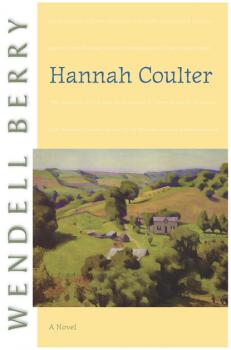ТОП просматриваемых книг сайта:
Port William
Скачать книги из серии Port WilliamАннотация
Old Jack, born just after the American Civil War and dying in contemporary times, spends one beautiful September day in Port William, his home since birth, remembering. The story tells of the most searing moments of Old Jack’s life, particularly his debt to his sister Nancy and her husband Ben Feltner, Old Jack’s model of what an honorable manhood and strength might be. "Few novelists treat both their characters and their readers with the kind of respect that Wendell Berry displays in this deeply moving account . . . The Memory of Old Jack is a slab of rich Americana." — The New York Times Book Review
Аннотация
“This is a book about Heaven,” says Jayber Crow, “but I must say too that . . . I have wondered sometimes if it would not finally turn out to be a book about Hell.” It is 1932 and he has returned to his native Port William to become the town's barber. Orphaned at age ten, Jayber Crow’s acquaintance with loneliness and want have made him a patient observer of the human animal, in both its goodness and frailty. He began his search as a «pre-ministerial student» at Pigeonville College. There, freedom met with new burdens and a young man needed more than a mirror to find himself. But the beginning of that finding was a short conversation with «Old Grit,» his profound professor of New Testament Greek. "You have been given questions to which you cannot be given answers. You will have to live them out—perhaps a little at a time." «And how long is that going to take?» «I don't know. As long as you live, perhaps.» «That could be a long time.» «I will tell you a further mystery,» he said. «It may take longer.» Wendell Berry’s clear-sighted depiction of humanity’s gifts—love and loss, joy and despair—is seen though his intimate knowledge of the Port William Membership.
Информация о книге
Автор произведения Wendell Berry
Жанр Современная зарубежная литература
Серия Port William
Аннотация
Published in 1967, we return to Port William during the Second World War to revisit Jayber Crow, the barber, Uncle Stanley, the gravedigger, Jarrat and Burley, the sharecroppers, and Brother Preston, the preacher, as well as Mat Feltner, his wife Margaret, and his daughter-in-law Hannah, whose son will be born after news comes that Hannah’s husband Virgil is missing. "The earth is the genius of our life,” Wendell Berry writes here. “The final questions and their answers lie serenely coupled in it."
Аннотация
Hannah Coulter is Wendell Berry’s seventh novel and his first to employ the voice of a woman character in its telling. Hannah, the now-elderly narrator, recounts the love she has for the land and for her community. She remembers each of her two husbands, and all places and community connections threatened by twentieth-century technologies. At risk is the whole culture of family farming, hope redeemed when her wayward and once lost grandson, Virgil, returns to his rural home place to work the farm.
Информация о книге
Автор произведения Wendell Berry
Жанр Современная зарубежная литература
Серия Port William




